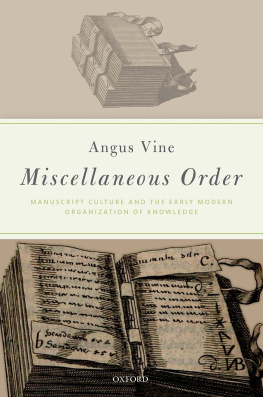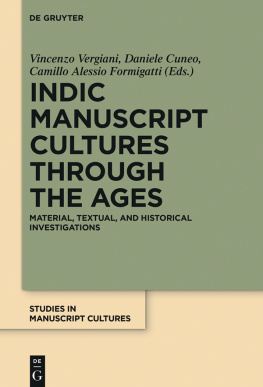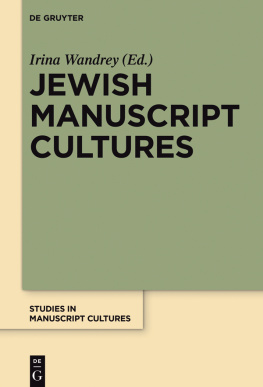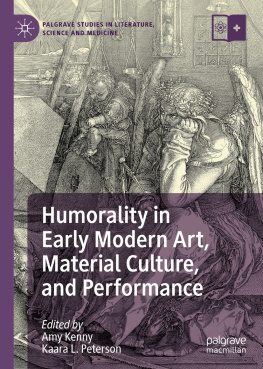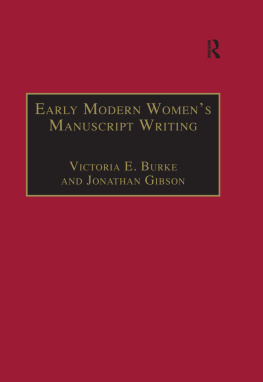Oxford University Press is a department of the University of Oxford. It furthers the Universitys objective of excellence in research, scholarship, and education by publishing worldwide. Oxford is a registered trade mark of Oxford University Press in the UK and in certain other countries
All rights reserved. No part of this publication may be reproduced, stored in a retrieval system, or transmitted, in any form or by any means, without the prior permission in writing of Oxford University Press, or as expressly permitted by law, by licence or under terms agreed with the appropriate reprographics rights organization. Enquiries concerning reproduction outside the scope of the above should be sent to the Rights Department, Oxford University Press, at the address above
You must not circulate this work in any other form and you must impose this same condition on any acquirer
Published in the United States of America by Oxford University Press 198 Madison Avenue, New York, NY 10016, United States of America
Links to third party websites are provided by Oxford in good faith and for information only. Oxford disclaims any responsibility for the materials contained in any third party website referenced in this work.
Acknowledgements
In the spring of 2008 things were starting to look grim. I had spent the past three years on a research fellowship at the Centre for Research in the Arts, Social Sciences, and Humanities (CRASSH) at the University of Cambridge, happily researching and writing about Sir Francis Bacons manuscripts. But the funding was running out and I needed to find an alternative position fast. By chance, in May that year, a couple of jobs were advertised on the AHRC-funded Scriptorium: Medieval and Early Modern Manuscripts Online project. I applied for one of these and was fortunate enough to be called to interview. At that interview, members of the project team asked me a series of questions about manuscript culture, about transcription and editorial policy, and about digital resources, most of which I had anticipated in one form or another. But then Colin Burrow asked me about the relationship between miscellany culture and antiquarianism, a question that I had very definitely not anticipated. I managed to give an off-the-cuff response, as interview etiquette (and good sense) demanded, but it struck me then that this characteristically searching question deserved much more careful thought. Nearly a decade later, this book is, in part, my more considered (and, I think, rather more satisfactory) answer to that question.
Happily, I still managed to get the job and spent an extremely rewarding year (20089) working as the Senior Research Associate on the project. The origins of this book, in terms of content as well as conception, date back to that time. Considerable thanks, therefore, go to all my colleagues on the Scriptorium project: Richard Beadle, Christopher Burlinson, Colin Burrow, Raphael Lyne, Sebastiaan Verweij, and Andrew Zurcher. Most of this book, though, was researched and written first at the University of Sussex and then at the University of Stirling (in the School of English and the Division of Literature and Languages respectively). Thanks go to my former colleagues in the Centre for Early Modern Studies at Sussex, but especially to Tom and Margaret Healy. At Stirling, I am similarly grateful to all my colleagues in English Studies; collegiality really is a wonderful thing. Thanks also go to John Drakakis, retired by the time I moved to Stirling, but who has done so much to make me welcome in Scotland.
Inevitably for a project this long in the making, I have incurred a number of debts, financial as well as intellectual and personal, and it is a great pleasure to have this opportunity to acknowledge all the help and support that I have received. In 200910 I was privileged to receive a short-term fellowship at the Folger Shakespeare Library, which allowed me to spend two wonderful months in Washington, DC, and to undertake preliminary archival work for this project in the most congenial and stimulating of settings. A quick glance at the bibliography will reveal how important the Folger has been to the project. Without the financial support of the British Academy, the project would also have been impossible: in 201315 I received a BA/Leverhulme Small Research Grant (reference: SG121302) for the project Manuscripts, Miscellanies, and the Organization of Knowledge. That grant funded much of the archival research which has ended up in the book. Additional thanks go to the School of English at the University of Sussex, who funded a return visit to the Folger in 2011, and to the School of Arts and Humanities Initiatives Fund at the University of Stirling, which enabled me to spend a concentrated period working on Hugh Plats manuscripts in the British Library (research which ended up as of this book). Thanks also go to the Division of Literature and Languages at Stirling, who kindly paid for the illustrations. I am immensely grateful, too, to the University of Stirling for granting me research leave in 2015, without which researching and writing an archival book project such as this would have been extremely difficult.
Over the past ten years I have profited enormously from numerous conversations about manuscript culture with friends and colleagues. Since 2012, I have spoken to Katie Halsey more than anyone about this project; from drafting the initial proposal to finishing the final chapter, I have benefited enormously from her friendship, perspicacity, and rigour. Alastair Craft, Hester Lees-Jeffries, Andrew Rudd, and Jane Slinn have, in different ways, been amongst the greatest supporters of this project. I am hugely grateful to them all, and for their friendship and company as much as anything. Thanks, too, go to Andrew for helping me to finalize the title of the book. I am similarly grateful to David Manning, who first heard me talk about early modern manuscripts at the Shakespeare Institute in 2010, and has been a constant source of recommendations and references since. I thank him, in particular, for the freezing afternoon in the away end at Brunton Park when we ended up discussing many of my final ideas for the book. Hearty thanks, too, go to Ayesha Mukherjee for encouraging me to look at Hugh Plats manuscripts in the first place and for persuading me to persevere with them when Plats tiny hand was threatening to get the better of me. Elaine Leong kindly shared unpublished work; I hope that one day Ill be able to repay the favour. Peter Beal was one of the earliest supporters of the project, and like everyone working on early modern manuscripts, I have benefited hugely from his magisterial Catalogue of English Literary Manuscripts 14501700 () owes a considerable debt to our collaboration over the years. Thanks, too, to Alan Stewart for the encouragement and support over the same period, and also for persuading me that the book really did need a bit more Aulus Gellius. In the final stages of the project, my former student Peter Buchanan acted as an unofficial research assistant, checking references for me in the Bodleian Library and the British Library, and thus saving me a series of costly journeys at busy times; I am immensely grateful to him. Thanks, too, to the following for comments, suggestions, and otherwise assisting in different ways: Danile Berton-Charrire, Carol Brobeck, Douglas Brodie, Piers Brown, Eric Castillo, Jim Caudle, Stephen Clucas, Liz Elliott, Ken Emond, Sietske Fransen, Jonathan Gibson, Ralf Hertel, Valerie Hotchkiss, Luke Houghton, Adrian Hunter, Dana Jalobeanu, Andrs Kisry, Peter Lindfield, Tom Lockwood, Mauricio Lopez, Kathryn McKee, the late Ann Moss, Anthony Ossa-Richardson, Jane Partner, Sandy Paul, Nick Popper, Adrienne Sharpe, Abi Shinn, Jonathan Smith, Julia Smith, Joe Sterrett, Adrian Streete, Dale Townshend, Sir Brian Vickers, Alison Wiggins, Kelsey Jackson Williams, Heather Wolfe, Dustin Frazier Wood, and Richard Yeo.

